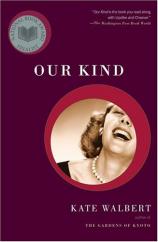Our Kind: A Novel in Stories
Review
Our Kind: A Novel in Stories
His name appears on page 155 of OUR KIND --- Hemingway himself, who contemplated a world in MEN WITHOUT WOMEN. Kate Walbert takes the other approach in OUR KIND, a disturbing novel of interrelated stories of women without men. While Hemingway's men were troubled heroes, Walbert's women are crumbling statues, the ruins of the ruins of ladies who knew nothing of sex and nothing of the real world when they married in the 1950s. They quickly grew to loathe their husbands and were at first fearful of their daughters and then envious. Tired of their wives' frigidity, pettiness and obsessions with dresses, drink, gardening and knitting, the men left for younger ladies.
There are exceptions. Esther Curran's husband left her by dying, but only after a long and loving relationship. No one understands this "eccentric" woman; Esther is an outsider to the women without men who populate the novel. Then there is the exception of "Him," a nameless realtor, a BMW-driving man of taste who has seemingly shown affection to and even slept with some of the women without men. The women without men include Viv, Canoe, Barbara, Judy, Louise, Mimi and Bambi, whose rather unsympathetic country club stories are related by an omniscient character or group of characters named "We," who narrates ten glimpses into the pasts and presents of each.
Divorcing herself from the reader, Walbert writes stutter-step of the halcyon days, complicating them with her brilliant poetics and maddening jumps between conversations and plastic surgeries, suicides, cancer, the untimely deaths of children, hospice, hat making, meal preparation, the loss of virginity, death, painting, lesbian longings, concert piano, book clubs, tennis, pools, dances, rumors, memories, college, first kisses, heavy petting, and wandering in the woods. Virginia Woolf and Jane Austen make predictable appearances, while the freezing "little match girl" who embodies the broken spirits of the women without men pulls at the heartstrings. OUR KIND is not a clear, concise look into the lives of the upper-class women of "the greatest generation." It is a revealing, stomach-churning rollercoaster ride into the confused, tortured minds of little girls trapped in women's bodies and women's lives.
The most horrifying tale is "Come As You Were," a party "We" attend at Canoe's house, donning "our" fifty-year-old wedding dresses. One attendee, with the rather telling name of Gay Burt, relates the details of her wedding night when husband Clark attempted to consummate the union. Gay, who instead hid in the hotel room armoire, reveals to the women without men that she would've rather been lying in bed with her sister Katherine. Party host Canoe sums up the feelings of the women without men: "'Sex?' she says. 'I'd rather pull weeds.'" And, as ex-wives, weeds are exactly what they have cultivated.
Walbert's oddly accomplished yet frustrating exploration of "We" as narrator turns to a third-person nightmare when, well into the novel, the characters' back stories, and penchant for viewing paintings of people as real people, blend into a bewildering cocktail of introspection comparable to, though not as convincing as, the short novels of Marguerite Duras, also famous for making the reader feel like an outsider, an uninvited guest. The reader becomes second fiddle to an Edith Whartonized suitor.
The novel's sparkling wedding band is the first story, "The Intervention," when "We" is introduced, speaking in a voice that is far clearer than in the novel's other stories. "We" are planning an intervention for "Him," the lone rooster in the yard of the women without men. In a droll yet moving scene, "We" practice on friend Pips Phelp, a poor stand-in for "Him." Walbert's art-for-art's-sake "We" experiment is gloriously successful in this first story, illustrating how "We" may be used, but only in moderation.
Reviewed by Brandon M. Stickney on January 14, 2011
Our Kind: A Novel in Stories
- Publication Date: December 28, 2004
- Genres: Fiction
- Paperback: 208 pages
- Publisher: Scribner
- ISBN-10: 0743245601
- ISBN-13: 9780743245609










